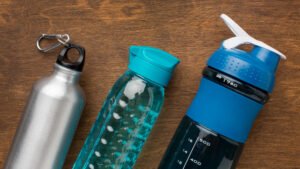When it comes to a healthier lifestyle, every choice matters – even the water bottle you choose. With an array of options available, From stainless steel to glass, and from plastic to aluminum, it’s essential to understand which water bottle is best suited for both your health and the environment.
Here’s a look at the factors that make a water bottle healthy and what makes it a good choice for hydration.

Types of Water Bottles
- Stainless Steel Bottles: These bottles are durable, re-usable, and make a good gift. They are also usually free of harmful chemicals like BPA. They are a popular choice among those looking for a long-lasting and eco-friendly option.
- Glass Bottles: Glass bottles offer a clean and non-toxic way to store water. They do not impart any taste or odor to the water and are an excellent choice for those concerned about chemical contamination.
- Aluminum Water Bottles: Lightweight and eco-friendly, aluminum water bottles are gaining popularity as a sustainable alternative to single-use plastic bottles. However, concerns have been raised about the potential for aluminum to leach into the water, particularly when the bottles are scratched or damaged.
- Copper water bottles: Rooted in Ayurvedic traditions, are prized for their potential health benefits, including antimicrobial properties and mineral infusion. Yet, caution is advised: prolonged storage may lead to copper leaching, and excessive intake can be harmful.
- Plastic Bottles: Plastic bottles are lightweight and convenient but often raise concerns about potential chemical leaching, particularly the presence of Bisphenol A (BPA), which can have adverse health effects.
What Water Bottles are BPA free?
BPA is a chemical commonly found in plastic products, including some water bottles. Various health issues have been linked to BPA exposure, including hormonal disruptions. Choosing BPA-free water bottles, whether plastic or alternative materials, is essential for minimizing potential health risks.
Many water bottles are now BPA-free, including stainless steel, glass, certain high-quality plastics like Tritan or HDPE, copper water, and silicone options. These alternatives offer safe hydration without the risk of BPA contamination.

Benefits of Drinking Water in Glass Bottles
- Purity: Glass is a non-porous material, ensuring that your water remains pure and free from contaminants.
- No Chemical Leaching: Unlike plastic bottles, glass does not leach any chemicals into the water, preserving its quality and taste.
- Environmentally Friendly: Glass is recyclable and can be reused indefinitely, making it a sustainable choice for eco-conscious individuals.
- Enhanced Taste: Glass does not retain any flavors or odors, allowing you to enjoy the natural taste of your water without any interference.
Choosing the right water bottle is crucial for maintaining both your health and the environment. Opting for BPA-free materials like stainless steel or glass can help ensure that your hydration habits support your overall well-being. So, next time you reach for a drink, consider the vessel it comes in – your body will thank you for it.




